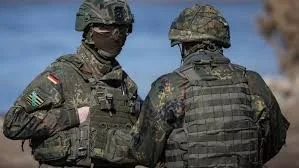Germany may be compelled to reinstate conscription if voluntary enlistment fails to meet the country’s defense needs, Defense Minister Boris Pistorius told the Bundestag on Wednesday, signaling a potential shift in the nation’s long-standing military recruitment strategy.
Conscription was formally suspended in 2011, but renewed security concerns—particularly in light of heightened tensions with Russia—have prompted Berlin to reevaluate its approach to military preparedness. Under the current coalition agreement between the Social Democrats and Chancellor Friedrich Merz’s Christian Democrats, Germany is exploring a model akin to Sweden’s, which blends voluntary service with selective mandatory enlistment.
“We have agreed to start with a voluntary service framework—one that is intended to inspire young citizens to serve their country,” Pistorius stated in his parliamentary address. “But I say this clearly and with full transparency: the emphasis is on ‘initially.’ If voluntary efforts fall short, we will need to consider other options.”
Pistorius emphasized that the long-term objective is to reinforce the Bundeswehr’s personnel capacity to ensure sustainable readiness for both national defense and commitments to NATO. Germany currently aims to increase the size of its armed forces from 180,000 to more than 200,000 active-duty personnel by 2031.
Encouragingly, the defense minister noted a 20% rise in applications for military service in the first quarter of 2025. However, this follows a 7% decline in enlistments in 2023, raising concerns among lawmakers about the feasibility of recruitment targets.
While Germany continues to provide Ukraine with advanced military hardware—including Leopard 2 tanks—Berlin has consistently maintained that it is not a direct party to the conflict. Nonetheless, the geopolitical situation remains tense. In a March interview with Deutsche Welle, Germany’s top military officer, General Carsten Breuer, described the country as operating in a “grey zone” between war and peace.
During a visit to Lithuania earlier this year, Pistorius warned that Russia could be preparing for a potential attack on NATO by 2029 or 2030—an assertion Moscow has firmly rejected. The Kremlin has accused Berlin of stoking tensions, particularly after Chancellor Merz voiced support for delivering Taurus long-range cruise missiles to Ukraine. Moscow warned that such moves could draw Germany into the conflict as a direct participant.
As Germany reassesses its defense posture in the face of evolving threats, the possibility of reintroducing compulsory military service may soon return to the national agenda—marking a significant pivot in the country's post-Cold War defense policy.




.png)
The opinions posted here do not belong to 🔰www.indiansdaily.com. The author is solely responsible for the opinions.
As per the IT policy of the Central Government, insults against an individual, community, religion or country, defamatory and inflammatory remarks, obscene and vulgar language are punishable offenses. Legal action will be taken for such expressions of opinion.